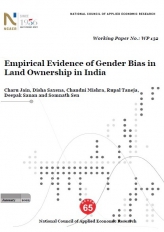Empirical Evidence of Gender Bias in Land Ownership in India
Charu Jain
Disha Saxena
Chandni Mishra
Rupal Taneja
Deepak Sanan
Somnath Sen
January 2022
Insecure land rights often constrain the economic prospects of women and make them vulnerable to poverty and gender-based violence. Despite the fact that women play critical roles in agricultural operations, they have limited access to, control and ownership of land. Even if women own lands, the area of these plots is smaller than or their quality is inferior to the lands owned by men. Therefore, an understanding of the distribution and inequities in landholding across gender, and the manner in which the laws and rules impact these, can provide important policy pointers. This paper looks at these issues based on the analysis of data for 12 States/Union Territories (UTs) in India that was extracted and used by NCAER for constructing the National Land Records and Services Index 2020 (N-LRSI 2020). The findings of the paper are expected to deepen the understanding of gender dimensions of land ownership in the selected States and UTs, and may assist in improving policies aimed at promoting more equitable gender outcomes pertaining to land ownership in India.
States, Sectors, Surveys, and Impact Evaluation







